Many people want to start a blog but prefer to keep their identity private for various reasons, such as privacy or safety concerns.
Blogging anonymously offers a solution by allowing you to write under a pseudonym or alias, ensuring your personal information stays protected.
With WordPress, setting up an anonymous blog is straightforward and secure. In this beginner’s guide, we’ll walk you through the steps to start blogging anonymously using WordPress while safeguarding your privacy.
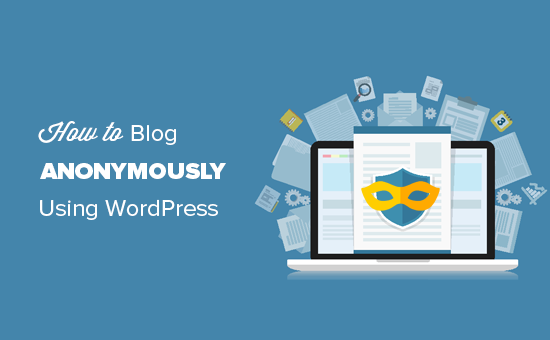
Note: This guide is not for journalists or whistle-blowers doing high-risk work. They should use something like TOR or other similar tools. This is for an average blogger who wants to blog anonymously.
Anonymous Blogging Pros & Cons
Many users want to blog anonymously to express their opinions or share their personal stories.
Some people choose to remain anonymous to avoid impacting how others perceive them in their personal lives, while others do it to unleash more creativity.
Blogging anonymously has pros and cons, and it’s important to understand them before you start.
Pros of Anonymous Blogging
- Freedom to share personal details or express opinions without being judged
- Protect your identity and personal information
- Keep your online private life separate from your professional life.
- Easily build authority. For example, you can create a trusted personal finance blog, even if you’re a painter by profession.
- Creative and artistic freedom
Cons of Anonymous Blogging
- Not able to meet with people who follow your blog
- Limited monetization options. You can still use Google AdSense, but you will have to share your personal information with Google.
- If someone is determined, then they can still trace your blog back to you.
That being said, let’s see how to blog anonymously.
Which Software to Use for Anonymous Blogging
We recommend starting your anonymous blog with WordPress. It is the most popular blogging platform in the world, used by 43% of all websites.
Why Use WordPress for Anonymous Blogging?
The following are some of the reasons that make WordPress the best choice for blogging anonymously:
- Full Privacy Control: Manage your data and privacy settings without relying on third-party platforms.
- Customizable: Choose privacy-focused themes and plugins to keep your identity hidden.
- Enhanced Security: Implement advanced security measures to protect your identity.
- Independent: Avoid third-party oversight to make sure your anonymity is fully preserved.
Keep in mind that there are two types of WordPress websites. First, there is WordPress.com, a hosted blogging service, and then you have WordPress.org, also known as self-hosted WordPress.
For comparison, see our guide on the difference between WordPress.com vs. WordPress.org.
We recommend WordPress.org because it gives you full freedom to blog anonymously.
We use WordPress for all our websites, you can read about our experience with the software in our detailed WordPress review.
How to Start an Anonymous Blog Using WordPress
First, you will need a domain name and a website hosting account to start your self-hosted WordPress blog.
We recommend using Hostinger. They are offering WPBeginner users a free domain with a generous discount on hosting.
Basically, you can get started for $2.69 per month.
We recommend Hostinger for anonymous blogging due to the two privacy features that they offer:
First, it accepts payments using digital currencies like Bitcoin.
Additionally, they include free Domain Privacy when you sign up, which is important for anonymous blogging. We will talk a bit more about domain privacy later.
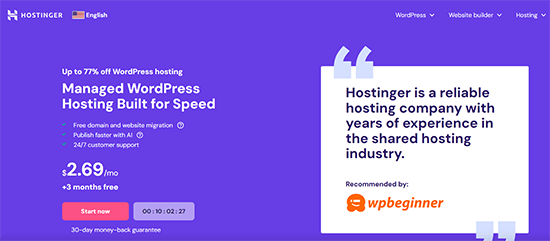
Once you have signed up for the hosting account, the next step is to install WordPress.
Hostinger offers a 1-click WordPress installer to easily set up your blog. You can also follow our WordPress installation tutorial for step-by-step instructions.
After you have installed WordPress, let’s make it anonymous.
Using Domain Whois Privacy
When you purchase a domain name, you must provide contact information, such as your name, address, phone number, and email address. This information is publicly accessible, and anyone can look it up.
Many domain name providers offer a service called Whois privacy to protect customer privacy. For a small fee, this service displays their contact information instead of yours.
If someone sends an email to the address on a WHOIS privacy page, it will be forwarded to you.
You can purchase domain privacy protection during the setup on most hosting companies.
For example, Hostinger automatically includes one year of free domain privacy when you purchase your hosting account using our Hostinger Coupon.
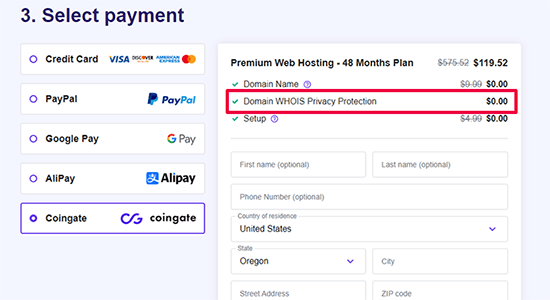
If you didn’t purchase it during setup, then you can always enable it from your hosting account’s dashboard under the domains section.
Using a Blogging Email Address
The next step is to create a new email account to use for your WordPress website and your author profile in WordPress.
You can create an anonymous email account using a free service like Gmail or a more private service like Proton Mail.
After you have created an email account, you need to add it as a WordPress administrative email address. This email address is used to send WordPress notification emails.
You can do this by going to the Settings » General page in the WordPress admin area and adding your new email address there.
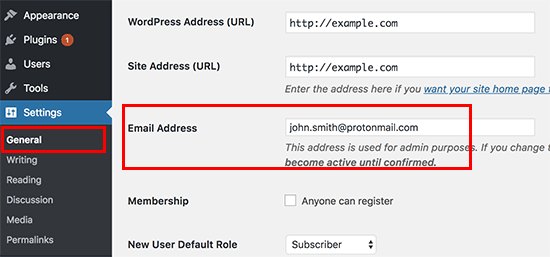
Don’t forget to click on the ‘Save Changes’ button to store your settings.
Next, you need to add the same email address to your author profile page. Simply go to the Users » Your Profile page and add the email address under your contact info.
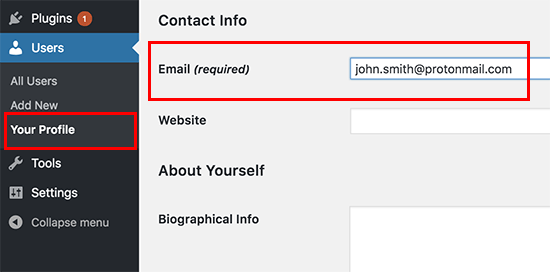
Don’t forget to click on the ‘Update Profile’ button to save your changes.
You can also use Gravatar to display an anonymous profile picture next to your author bio under your blog posts.
Tip: If you’re not receiving WordPress emails, check out our guide on how to fix WordPress not sending emails.
Using a Pen Name for Anonymous Blogging
You will need to choose and use a pen name, also known as a pseudonym, on your blog. You cannot just use admin as your username or author name for better WordPress security.
You will need to think of a different fake name that you can use to show your blog content.
To add your pen name, you need to visit the Users » Your Profile page and add the name next to the ‘Nickname’ field.
After entering your nickname, click on the drop-down menu next to the ‘Display name publicly as’ option and select your nickname.
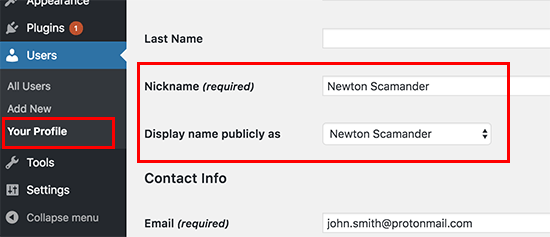
If you want to hide your real identity, you mustn’t add your real first and last name to this user profile.
Don’t forget to click the ‘Update Profile’ button to save your changes.
Using a VPN
VPN (Virtual Private Network) that helps you secure your internet connection and protect your identity.
Normally, all your internet traffic travels through different servers spread across the world. Hackers and governments can spy on this traffic and see what you are doing online.
A VPN acts as a network between your computer and the outside world. All your internet traffic goes to a VPN service, where it is encrypted and sent to the destination using a random server in a different geographic location.
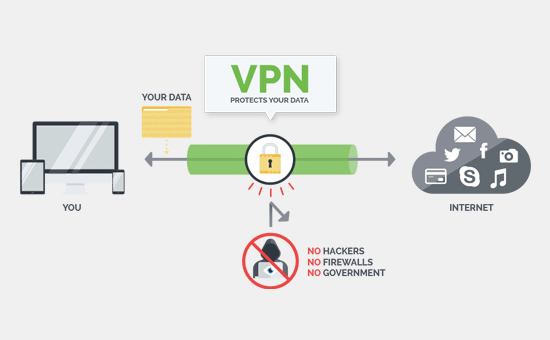
Here is a list of the best VPN service providers to help you find the best solution for your needs.
At WPBeginner, we recommend using IPVanish.
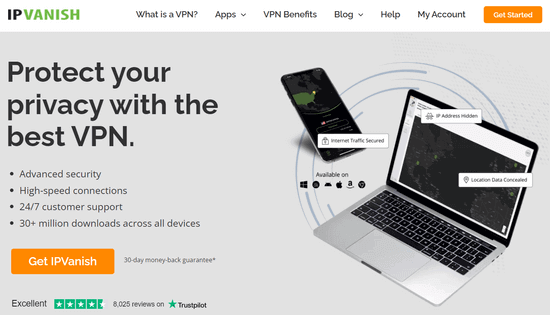
IPVanish offers military-grade encryption and a network of over 40,000 shared IP addresses and thousands of servers.
They also have the easiest software to turn on VPN with the click of a button on any device, including laptops, tablets, and mobile phones.
Building a Successful Blog as an Anonymous Blogger
Even though you want to maintain your online privacy by keeping your blog anonymous, it’s still possible to grow your blog and make money from it.
Here are some tips to make your anonymous blog more successful:
Promote Your Blog on Social Media
You can create anonymous social media accounts to promote your blog and drive more traffic to your site. We also recommend installing social media plugins so that your readers can share your content with others.
Start Guest Blogging
Guest blogging, which involves writing high-quality articles for other websites in exchange for a backlink, is another great way to drive more traffic to your blog.
You can write guest posts under your pen name to keep your identity private.
Monetize Your Anonymous Blog
There are strategies to make money blogging while keeping your identity hidden from the public. For example, you can make money with affiliate marketing by promoting other companies’ products to your audience.
You can also create and sell online courses, eBooks, or other digital products under your pen name using plugins like MemberPress or Easy Digital Downloads.
Additional Resources
Following are some of the helpful guides we have published on remaining anonymous while building a blog, website, or online community.
- How to Create a Truly Anonymous Website (Step by Step)
- How To Buy a Domain Name Anonymously (3 Easy Ways)
- How to Allow Users to Post Anonymous Comments to your WordPress blog
- How to Add Ask Me Anything Anonymously in WordPress
- How to Allow Users to Submit Posts to Your WordPress Site
We hope this article helped you learn how to blog anonymously using WordPress. You may also want to see our pick of the best content protection WordPress plugins and the best free Google tools every WordPress blogger should use.
If you liked this article, then please subscribe to our YouTube Channel for WordPress video tutorials. You can also find us on Twitter and Facebook.





Olaf
Personal safety and anonymity on the internet can often be very important. I worked on a website where we helped a client create a page about his experience with drug addiction and how he overcame it. This is exactly the kind of situation where you might not want others to know your identity. Many things can be hidden, but it’s also easy to overlook certain details, leaving the person still traceable. This is an excellent and detailed guide on how to do it thoroughly and not miss anything. Bravo.
Jiří Vaněk
These are truly invaluable tips. I realized how important it is to have the ability to blog anonymously when the war in Ukraine broke out not far from our borders. Many Ukrainian journalists fled to our country and are trying to inform the outside world about what’s happening there. Naturally, they are being watched because some of the information they share might be uncomfortable for the other side. Only then do you understand how valuable advice on hiding one’s identity as a journalist can be. And this isn’t limited to just this situation. Sometimes, people simply want to write about socially sensitive topics and don’t want their true identity known. For such cases, this article is also a literal treasure trove of information. Thank you for detailing the topic of anonymous blogging so thoroughly. It’s very interesting and engaging reading for me as well.
SW
Thank you for this helpful post. Can you explain your comment, “If someone is really determined, then they can still trace your blog back to you.” in regards to the cons of Anonymous Blogging Using WordPress. If someone used something like IPVanish wouldn’t that mean they couldn’t trace your blog back to you? Also, if you use a pseudonym, wouldn’t they only trace it back to your fake name?
WPBeginner Support
There are other methods for tracking back to the owner of a site that the workarounds you mention would not solve. We are not sharing the specifics in this article to prevent abuse.
Admin
Carl
VPN is a very useful tool for those who want to protect their identity. i do use NordVPN when I am writing my blog. I can not imagine how people are living without a security app like Nord.
WPBeginner Support
Thanks for sharing the VPN you are using for those looking at their options
Admin
zsquare
Thanks for this article. for every of the methods above, does it mean one will not be able to monetise the blog except through Google adsense ?
WPBeginner Support
Unless who you are monetizing your site with states otherwise, you should be able to monetize the site.
Admin
angela murray
I want to set up an anonymous blog in the united kingdom. Please tell me how i can do this. Thank you
WPBeginner Support
It would be the same method as in this article.
Admin